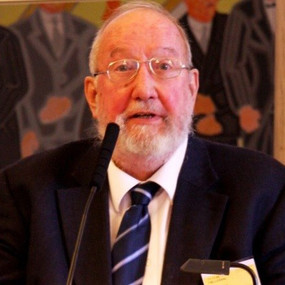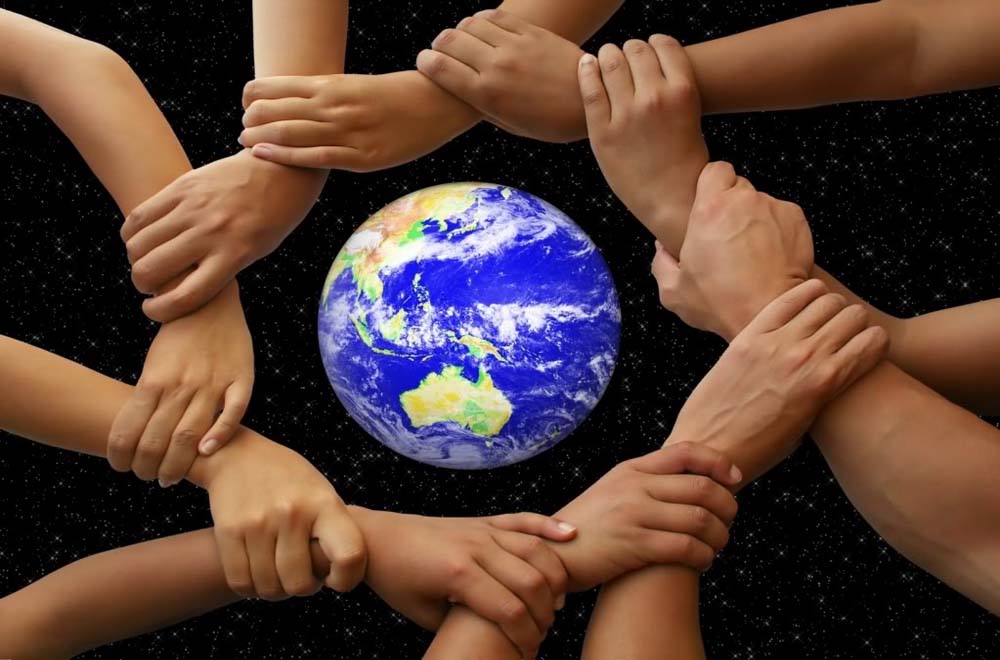Why is the World at a Precipice? How to Deal with it?
Hear EACPE’s senior board members respond
2- John Scales Avery — EXCLUSIVE for EACPE
Caring for the future of our children
Our present situation is this:
The greatest threats to the future of human society and the biosphere are catastrophic climate change and thermonuclear war, but a large-scale global famine also has to be considered.
We give our children loving care, but it makes no sense do so and at the same time to neglect to do all that is within our power to ensure that they and their descendants will inherit an earth in which they can survive. We also have a responsibility to all the other living organisms with which we share the gift of life.
Inaction is not an option. We have to act with courage and dedication, even if the odds are against success, because the stakes are so high.
We need a new economic system, a new society, a new social contract, a new way of life. Here are the great tasks that history has given to our generation: We must achieve a steady-state economic system. We must restore democracy in our own countries wherever it has been replaced by oligarchy. We must decrease economic inequality. We must break the power of corporate greed. We must leave fossil fuels in the ground. We must stabilize and ultimately reduce the global population. We must eliminate the institution of war. And finally, we must develop a more mature ethical system to match our new technology.
We must achieve a steady-state economic system
A steady-state economic system is necessary because neither population growth nor economic growth can continue indefinitely on a finite earth. No one can maintain that exponential industrial growth is sustainable in the long run except by refusing to look more than a short distance into the future.
We must restore democracy
It is obvious, almost by definition, that excessive governmental secrecy and true democracy are incompatible. If the people of a country have no idea what their government is doing, they cannot possibly have the influence on decisions that the word “democracy” implies.
The revelations of Edward Snowden have shown that the number of people involved in secret operations of the United States government is now as large as the entire population of Norway: roughly 5 million. The influence of this dark side of government has become so great that no president is able to resist it.
We must decrease economic inequality
In his Apostolic Exhortation, “Evangelii Gaudium”, Pope Francis said: “In our time humanity is experiencing a turning-point in its history, as we can see from the advances being made in so many fields. We can only praise the steps being taken to improve people’s welfare in areas such as health care, education and communications. At the same time we have to remember that the majority of our contemporaries are barely living from day to day, with dire consequences. A number of diseases are spreading. The hearts of many people are gripped by fear and desperation, even in the so-called rich countries. The joy of living frequently fades, lack of respect for others and violence are on the rise, and inequality is increasingly evident. It is a struggle to live and, often, to live with precious little dignity.”
“Just as the commandment ‘Thou shalt not kill’ sets a clear limit in order to safeguard the value of human life, today we also have to say ‘thou shalt not’ to an economy of exclusion and inequality.”
We must break the power of corporate greed
When the United Nations was established in 1945, the purpose of the organization was to abolish the institution of war. This goal was built into many of the articles of the UN Charter. Accordingly, throughout the world, many War Departments were renamed and became Departments of Defense.
But the very name is a lie. In an age of nuclear threats and counter-threats, populations are by no means protected. Ordinary citizens are just hostages in a game for power and money. It is all about greed – the greed of arms manufacturers – the greed of politicians whose votes have been purchased by the military-industrial complex against which Eisenhower warned in his famous Farewell Address.
We must leave fossil fuels in the ground
The threat of catastrophic climate change requires prompt and dedicated action by the global community. Unless we very quickly make the transition from fossil fuels to 100% renewable energy, we will reach a tipping point after which uncontrollable feedback loops could take over, leading to a human caused 6th geological extinction event. This might even be comparable to the Permian-Triassic event, during which 96% of all marine species and 70% of terrestrial vertebrates became extinct.
We must stabilize, and ultimately reduce, global population
According to the World Resources Institute and the United Nations Environment Programme, “It is estimated that since World War II, 1.2 billion hectares…[of agricultural land] has suffered at least moderate degradation as a result of human activity. This is a vast area, roughly the size of China and India combined.” This area is 27% of the total area currently devoted to agriculture. The report goes on to say that the degradation is greatest in Africa.
David Pimental and his associates at Cornell University pointed out in 1995 that “Because of erosion-associated loss of productivity and population growth, the per capita food supply has been reduced over the past 10 years and continues to fall. The Food and Agricultural Organization reports that the per capita production of grains which make up 80% of the world’s food supply, has been declining since 1984.”
Pimental et al. add that “Not only is the availability of cropland per capita decreasing as the world population grows, but arable land is being lost due to excessive pressure on the environment. For instance, during the past 40 years nearly one-third of the world’s cropland (1.5 billion hectares) has been abandoned because of soil erosion and degradation. Most of the replacement has come from marginal land made available by removing forests. Agriculture accounts for 80% of the annual deforestation.”
We must eliminate the institution of war
The problem of achieving internal peace over a large geographical area is not insoluble. It has already been solved. There exist today many nations or regions within each of which there is internal peace, and some of these are so large that they are almost worlds in themselves. One thinks of China, India, Brazil, Australia, the Russian Federation, the United States, and the European Union. Many of these enormous societies contain a variety of ethnic groups, a variety of religions and a variety of languages, as well as striking contrasts between wealth and poverty. If these great land areas have been forged into peaceful and cooperative societies, cannot the same methods of government be applied globally?
New ethics to match new technology
Modern science has, for the first time in history, offered humankind the possibility of a life of comfort, free from hunger and cold, and free from the constant threat of death through infectious disease. At the same time, science has given humans the power to obliterate their civilization with nuclear weapons, or to make the earth uninhabitable through overpopulation and pollution.
The question of which of these paths we choose is literally a matter of life or death for ourselves and our children. Will we use the discoveries of modern science constructively, and thus choose the path leading towards life? Or will we use science to produce more and more lethal weapons, which sooner or later, through a technical or human failure, may result in a catastrophic nuclear war? Will we thoughtlessly destroy our beautiful planet through unlimited growth of population and industry? The choice among these alternatives is ours to make. We live at a critical moment of history, a moment of crisis for civilization.
About the Author

Prof. John Scales Avery is fellow board member of the Eqbal Ahmed Centre for Public Education. He is an accomplished theoretical chemist who also has a long history of working on causes of peace, economic equality, and helping us think of what a better world could look like. He is the author of many books, both on scientific and social-political issues.



